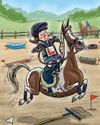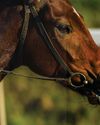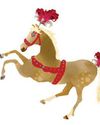
GENERALLY, geldings are much easier than stallions to handle, particularly around mares. Unless the plan is to breed from a proven stallion with a good performance record, it is best to consider castration. There are enough unwanted horses already and having a colt can result in surprise foals surplus to requirements.
Equine castration, or gelding, is one of the most frequent routine operations any equine vet performs. It is usually straightforward, although a recent review from Liverpool Vet School reported intraoperative and postoperative complication rates in 10–60% of cases, with 14.5% of castrations having one or more complications.
Such complications can occur at any time, from minutes or hours after castration to days, months or years later.
The degree of severity of these complications ranges widely. Some cause no distress to the horse but are a concern for the owner (such as swelling or continued undesirable behaviour), or they may be mild complications that resolve with minimal intervention, such as oedema (fluid buildup) or localised infection.
Severe and life-threatening complications (bleeding, prolapsed gut or abdominal infection or inflammation) can also occur. Despite castration being a routine surgical procedure, mortality rates of up to 1% are reported.
There are many factors to consider; it is best to discuss the various options with your vet in advance. These include timing, the best method for that individual horse and the appropriate aftercare. The two big questions are:
- Whether to do a standing castration using sedation and local anaesthetics, or castration under general anaesthesia.
- Whether to have the operation done in the home yard or at an equine hospital.
The answer is, it depends.
WHAT TO CHECK
This story is from the {{IssueName}} edition of {{MagazineName}}.
Start your 7-day Magzter GOLD free trial to access thousands of curated premium stories, and 9,000+ magazines and newspapers.
Already a subscriber ? Sign In
This story is from the {{IssueName}} edition of {{MagazineName}}.
Start your 7-day Magzter GOLD free trial to access thousands of curated premium stories, and 9,000+ magazines and newspapers.
Already a subscriber? Sign In

'Is it time for a scheduling rethink?'
Ronnie Lee Jones on calendar clashes and the growing trend of leasing

Bloodstock auctioneer
Shirley Anderson-Jolag on a background in performing arts, practising with her dog and imposter syndrome

'You could put your granny on him'
Losing your confidence, or not having much to begin with, can be both frustrating and traumatic. Alex Robinson meets riders who have pushed through barriers, aided by some special horses

Nielson nails it
An exciting new partnership seals grand prix honours and several riders come to the fore on unexpected catch rides

What's that noise?
Diseases of the upper airway are colloquially known as problems with the horse's “wind”, and often manifest as noise. Phil Cramp MRCVS explains

Oliver Townend
A man who'd prefer to let his horses do the “talking”, the nine-time five-star winner sits down with Catherine Austen to discuss the inimitable Ballaghmor Class and why he considers horses his true mates

Happy groom, happy horse
Top grooms give Charlie Fiset an insight on how the best employers help them thrive in the work they love, and how to recruit quality employees

Pocket rocket springs a surprise
Annabel Widdowson launches her 2025 campaign with a double qualification and a 15.2hh mare is flying

'I viewed myselfas a girl - no match for the men'
Geraldine Rees on her historic ride in the 1982 Grand National and her knack of finding sympathy with tricky horses

Soegaards Bon Royal
Laura Tomlinson's grand prix star took her back to London for the first time in eight years and looks set for a bright future. Oscar Williams meets him